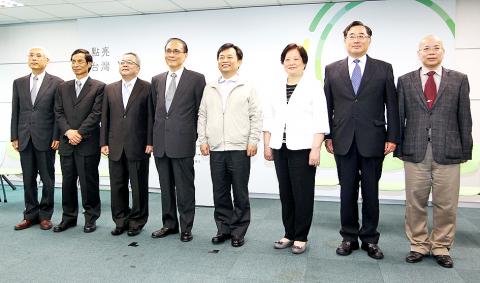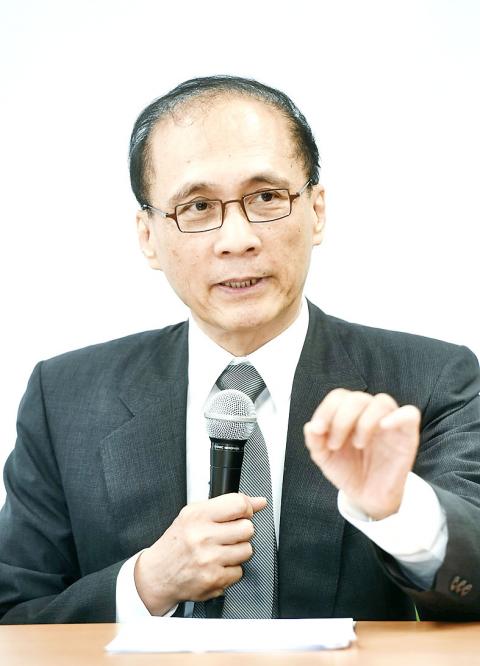Premier-designate Lin Chuan (林全) yesterday introduced eight future Cabinet members, including the vice premier, the Cabinet spokesman, four ministers without portfolio and the future minister of health and welfare, to the media.
Speaking at a news conference yesterday afternoon, Lin introduced the first eight members of his future Cabinet, including future vice premier Lin Hsi-yao (林錫耀), future minister of health and welfare Lin Tzou-yien (林奏延), ministers without portfolio Lin Mei-chu (林美珠), Chang Ching-sen (張景森), Shih Jun-ji (施俊吉) and Hsu Chang-yao (許璋瑤), and future Cabinet spokesman Tung Chen-yuan (童振源) — who did not appear at the press conference as he is currently in the US as a visiting professor.
Lin Chuan said that all of the confirmed Cabinet members have served in government positions at different levels, and that he had worked well with all of them previously.

Photo: CNA
“I worked closely with Lin Hsi-yao during the presidential election, and we had good discussions on various issues,” Lin Chuan said. “I first met him when he was Taipei County’s [now New Taipei City] deputy commissioner, and I was the Directorate-General of Budget, Accounting and Statistics minister. I had a very good impression of him, since he could appear soft when trying to convince people, but remains firm over his views.”
Having served not only as deputy county commissioner, but also several positions in the Democratic Progressive Party (DPP), as well as in the Cabinet during the previous DPP administration, Lin Chuan said that Lin Hsi-yao is good at negotiating, and could be very helpful in facilitating communications in the Cabinet and with the legislature.
As for Chang, Lin Chuan said that, as a former head of the Council for Economic Planning and Development — now renamed the National Development Council — he would play a key role in planning for national development, transportation, energy and social housing.

Photo: Fang Pin-chao, Taipei Times
Asked whether his appointment of Lin Mei-chu as a minister without portfolio would entail a conflict of interest, since Lin Mei-chu is Tsai’s cousin, Lin Chuan said that Lin Mei-chu would be serving in the Executive Yuan, not the Presidential Office.
“Professionalism, ability and experience are the only conditions I would consider,” the premier-designate said.
Lin Chuan also said that the decisions on future Cabinet members are not made by any one person.
“We have a team — I am not going to name everyone on the team, but Tsai and I are both on it — to make proposals and discuss possible candidates,” Lin Chuan said.
“Tsai and I often have different ideas, but I have the final say on it,” the premier-designate added.
Meanwhile, Lin Tzou-yien said that he had not attended a WHA meeting before, but that he would ask Minister of Health and Welfare Chiang Been-huang (蔣丙煌) for advice, and that because he considers himself familiar with the work, he expects the trip to go smoothly.
In response to whether Taiwan would have to attend the meeting under the “one China” principle, Lin Tzou-yien said he has not received the invitation yet, and because he would ask for Chiang’s advice in advance, he does not want to make any remarks on the issue yet.
Additional Reporting by Lee I-chia

DAREDEVIL: Honnold said it had always been a dream of his to climb Taipei 101, while a Netflix producer said the skyscraper was ‘a real icon of this country’ US climber Alex Honnold yesterday took on Taiwan’s tallest building, becoming the first person to scale Taipei 101 without a rope, harness or safety net. Hundreds of spectators gathered at the base of the 101-story skyscraper to watch Honnold, 40, embark on his daredevil feat, which was also broadcast live on Netflix. Dressed in a red T-shirt and yellow custom-made climbing shoes, Honnold swiftly moved up the southeast face of the glass and steel building. At one point, he stepped onto a platform midway up to wave down at fans and onlookers who were taking photos. People watching from inside

A Vietnamese migrant worker yesterday won NT$12 million (US$379,627) on a Lunar New Year scratch card in Kaohsiung as part of Taiwan Lottery Co’s (台灣彩券) “NT$12 Million Grand Fortune” (1200萬大吉利) game. The man was the first top-prize winner of the new game launched on Jan. 6 to mark the Lunar New Year. Three Vietnamese migrant workers visited a Taiwan Lottery shop on Xinyue Street in Kaohsiung’s Gangshan District (崗山), a store representative said. The player bought multiple tickets and, after winning nothing, held the final lottery ticket in one hand and rubbed the store’s statue of the Maitreya Buddha’s belly with the other,

‘NATO-PLUS’: ‘Our strategic partners in the Indo-Pacific are facing increasing aggression by the Chinese Communist Party,’ US Representative Rob Wittman said The US House of Representatives on Monday released its version of the Consolidated Appropriations Act, which includes US$1.15 billion to support security cooperation with Taiwan. The omnibus act, covering US$1.2 trillion of spending, allocates US$1 billion for the Taiwan Security Cooperation Initiative, as well as US$150 million for the replacement of defense articles and reimbursement of defense services provided to Taiwan. The fund allocations were based on the US National Defense Authorization Act for fiscal 2026 that was passed by the US Congress last month and authorized up to US$1 billion to the US Defense Security Cooperation Agency in support of the

HIGH-TECH DEAL: Chipmakers that expand in the US would be able to import up to 2.5 times their new capacity with no extra tariffs during an approved construction period Taiwan aims to build a “democratic” high-tech supply chain with the US and form a strategic artificial intelligence (AI) partnership under the new tariffs deal it sealed with Washington last week, Taipei’s top negotiator in the talks said yesterday. US President Donald Trump has pushed Taiwan, a major producer of semiconductors which runs a large trade surplus with the US, to invest more in the US, specifically in chips that power AI. Under the terms of the long-negotiated deal, chipmakers such as Taiwan Semiconductor Manufacturing Co (TSMC, 台積電) that expand US production would incur a lower tariff on semiconductors or related manufacturing